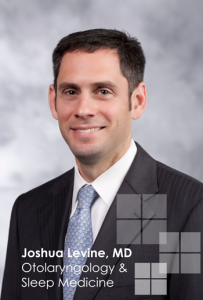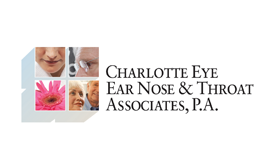By Dr. Joshua Levine, Pediatric and Adult ENT, Pediatric and Adult Sleep Medicine, Charlotte Eye Ear Nose and Throat Associates
There is nothing better for a parent than for their child to be well rested. New parents quickly understand the value of a good night’s sleep. A well rested child is generally happy, cooperative and ready to start the day. Children (and parents!) who do not get a good night’s sleep can be cranky, moody and irritable. Insufficient sleep, whether due to a several nights of illness, or longstanding poor sleep quality, affects both the daily function and the long term health of our children.
What is the normal amount of sleep a child should obtain?
One of the most common causes of poor sleep quality is inadequate sleep or “behaviorally insufficient sleep.” How much sleep (Including naps) is recommended at a given age?
– Newborns 16 hours
– Infants 12-14 hours
– Toddlers 11-13 hours
– Preschool 11-12 hours
– School age 9-11 hours
– Adolescence 9-9.5 hours
These numbers may be surprising for some, as there are children that may need more or less sleep than average. However, sometimes, just an extra 20-30 minutes per night over the week (over three hours additional sleep!) can be a game changer.
How do we get our child to sleep at the proper time?
For families with children having difficulty falling or staying asleep, we teach parents how to help their children master sleep, just like learning the ABC’s. There are validated scientific techniques called: modified extinction, graduated extinction, positive routines, faded bedtime with response cost, and scheduled awakenings that are parenting strategies to teach the child “self soothing”. Many of these techniques, if started at a young age, even as young as three months, can produce lasting results for the dedicated family. Once either positive or negative patterns are developed, or even accidentally reinforced, they are much harder to break as the child matures. As physicians, we help parents decide which strategy is best for a family, then encourage consistent use in all caregivers. Of course, there may be real-life setbacks that happen, but once children learn to fall asleep on their own, it’s much easier for them to remember how to do this.
What are some common sleep disorders in children?
Common sleep disorders include obstructive sleep apnea, nightmares, night terrors, restless leg syndrome, teeth grinding, and delayed phase sleep syndrome. Most of these are diagnosed by history, but some others require a sleep study. Rare complaints, like “I feel paralyzed when I am about to fall asleep” can be a sign of a more severe sleep disorder. Some rare seizures happen more frequently at night. Most sleep problems are infrequent and not harmful, and with time children will grow out of them.
My child snores. How do I know if they have Obstructive Sleep Apnea?
Not every child who snores has obstructive sleep apnea. In general, 3-5% of children may have sleep apnea, but there are certain risk factors that increase the odds. Increased tonsil size, being overweight, witnessed gasping at night, fatigue or even hyperactivity during the day, may be signs of sleep apnea. Untreated sleep apnea can affect school performance or can cause headaches, poor behavior, metabolic syndrome, night sweats and even bedwetting. A visit to your physician can help to make this diagnosis and recommend treatment options.
My teen sleeps until noon on the weekends! What do I do?
Most of the time, this is a due to inadequate sleep throughout the school week. Teens naturally move their bedtime to later in the night (delayed phase), but still have to wake early for school. Just like your little one needed to take naps frequently, this is a sign of sleep debt that needs payback on the weekends. Unfortunately, a tired teen is at increased risk of: decreased cognitive processes in general, impulsivity and risk taking, motor vehicle accidents, headaches, worsening depression or anxiety and difficulty performing in school. Helping your child get enough rest is as beneficial for your teenager as it is for your infant.
When should I see a sleep specialist?
A good night’s sleep is just as important for our children as it is for us. If you notice a pattern of poor sleeping, fatigue, irritability in the morning, severe snoring or other frequent nighttime complaints, it may be appropriate to review these with one of our board certified sleep physicians. We look forward to helping you and your child get a good night’s sleep.
![]()
Dr Joshua Levine 
Charlotte Eye Ear Nose & Throat Associates
Pediatric and Adult ENT
Pediatric and Adult Sleep Medicine
Dr. Levine is a Fellowship-trained physician, who attended Duke University for his Undergraduate Degree. He went on to Boston University School of Medicine for his Medical Degree, and then completed his Internship and Residency at the University of Miami.
Dr. Levine practices at the Blakeney location.


